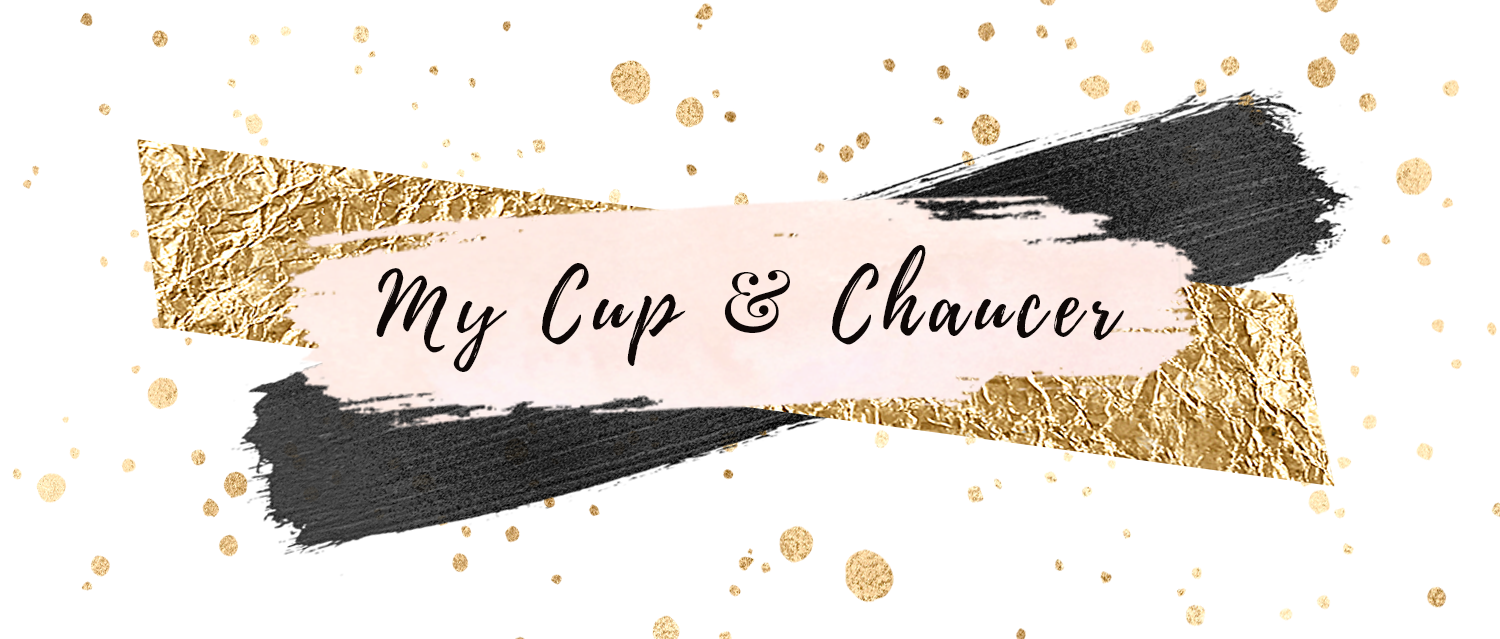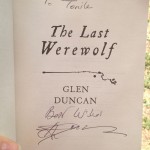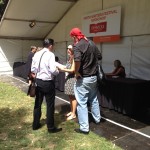I embarked from Brisbane to my third writers festival on Thursday Feb 23, bound for the west coast and the beautiful city of Perth. Why would I travel so far for a few days of listening to authors and publishers talk about the fine art of writing? I love having the opportunity to get up close and personal with the minds behind some of my favourite characters. I love being able to have a discussion with the people whose words keep me up all night and change the way I see the world. It’s a rare opportunity to meet with authors who have sold millions of copies of their books, or whose books have won prestigious international awards. And with a line-up as stellar as what Perth was offering, it was impossible to not go.
Day One (Friday Feb 24)
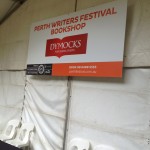 The Dymocks bookshop, where lots of my money was spent.
The Dymocks bookshop, where lots of my money was spent.
I purposely picked afternoon sessions for the first day to give myself time to adjust to an entirely unfamiliar city. Evidently, public transport in Perth is highly advanced and getting from the CBD to the University of WA was a breeze. My first session of the day was “Reading in an Age of Change” with two exceptional panellists, Malcolm Neil and Alan Sheardown (I’m popping small bios of everyone I saw at the bottom of this post). Given their respective backgrounds of marketing books and selling books, they both offered different opinions regarding the future of the book industry. They discussed the spectacular collapse of Borders in 2011, arguing that chain stores were inevitably beaten at their own game.
I found this interesting – from what I know, despite the hysteria and blame placed upon online booksellers and e-Books, the primary cause of the collapse was internal mismanagement and an unsustainable business model. It is clear that there was an over-supply of bookstores in Australia, and with the shift in discretionary spending that has accompanied the financial turmoil of the past few years, the book industry was essentially ‘rationalised’, and not everyone was going to survive. Though online stores have undoubtedly contributed to the decline in the Australian book industry, they are not entirely to blame. Shoppers at Borders/Angus & Robertson stores would be all too familiar that while there may have been incredibly cheap new release books on the front tables, the backlist found inside was highly overpriced, sometimes 20-30% higher than RRP. People, despite how they behave sometimes, aren’t stupid. Consumers realise these things. We are happy to buy in store, as opposed to online, as long as we feel we’re not being ripped off.
An audience member piped up about the price of books in Australia being significantly more expensive when compared to overseas markets, especially in the UK, the USA and Canada. This is largely to do with legislation around parallel import restrictions (PIRs) – in 2009 the Australian Government decided to retain parallel import restrictions on books, despite the Productivity Commission recommending these restrictions be removed. However, given that most major publishing houses in Australia are local arms of global houses, a vast majority of the benefits from PIRs are going to international authors. All this inevitably means is upward pressure on book prices that were valued when the $AUD was buying roughly 50 US cents and 0.5 pounds. This is why, when you look on the back of a book, it may say $7.99 US, yet be priced $22.99 here.
So what does all this mean for the viability of the book industry? According to the panellists, a significant drop in the number of bookstores, and the most profitable and successful ones remaining will be boutique bookstores that either a) cater to a specific audience or b) incorporate other elements into their store to make it a wider experience. Unambiguously the industry is undergoing substantial change and evolution, but the bricks and mortar bookstore will never (should never?) disappear completely. People will continue to read, but will engage with books in new ways. Australians, despite being thought of as an early-adopting country, are rather conservative and have yet to make the paradigm shift to e-Books seen in other countries. But with the array of tablets/e-Readers on the market, and the reasonable prices of e-Books, it is only a matter of time before Australians adopt the new technology. Again, how bookstores adapt to these changes will ensure their survival into the future. There are still people out there (myself included) who love the experience of shopping amongst books, and who prefer tangible books over words on a screen. As long as publishers, marketing managers and booksellers are intelligent and tactical in their approach, the demand will remain.
First autograph of the Festival!
The second session, “It’s All Speculation”, was about speculative fiction and featured a super distinguished panel of Laura Beukes, Lara Morgan and Carole Wilkinson. The common theme between the three women was that in some way they had manipulated the past or present to fit their stories. Laura and Lara have played with modern and future scenarios – Laura’s two novels have created alternate realities; one where a global company is trying to take over the world, and another where convicted criminals are assigned magical animals as a sort of ‘scar’ of their crime (think Scarlett Letter revamped). Fascinating concepts that deal with deeper issues like consumerism, power, racism and prejudice. Heavy stuff! Lara on the other hand has set her Rosy Black novels 500 years in the future. Evidently the world didn’t come out so well in the battle with climate change, and her depiction of Perth paints a bleak picture of a possible future.
Carole Wilkinson, on the other hand, set her stories about dragons 2000 years ago in Ancient China. She spoke of the difficulty in authentically capturing Ancient China; at one point, she researched what kind of trees would have been growing at that time. She has such a remarkable self-imposed duty of care to her readers to present the past as accurately as possible. It was truly admirable. All three women, Carole to a lesser extent, spoke of the creativity that is available to you when you are dabbling in realities that have not ever existed. With that said, they also spoke of a certain restraint and adherence to pre-established scientific laws (Lara in particular spoke of her willingness to conform to the laws of physics) – a theme re-iterated by other authors on day two. I’m not the biggest fan of dragons, so I didn’t buy Carole’s book; however I did purchase Laura and Lara’s first novels, so I will be posting reviews of them shortly.
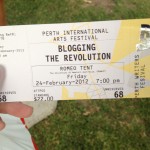 My third and final session of the day was “Blogging the Revolution” with John Birmingham, Marieke Hardy and Paul French. Straight off the bat, John Birmingham is insane. And I mean that with upmost respect; it’s the sort of zany crazy that people can’t help being mesmerized by. He was a delight to meet. The discussion was so varied and interesting – Paul especially had some interesting remarks about the online environment in China. Most of the audience, again myself included, had now idea how tightly regulated the Chinese internet is. Facebook and Twitter are banned (that I knew) but literal net nannies trawl the internet for political commentary and delete it. Insane! A kind of world I can not imagine.
My third and final session of the day was “Blogging the Revolution” with John Birmingham, Marieke Hardy and Paul French. Straight off the bat, John Birmingham is insane. And I mean that with upmost respect; it’s the sort of zany crazy that people can’t help being mesmerized by. He was a delight to meet. The discussion was so varied and interesting – Paul especially had some interesting remarks about the online environment in China. Most of the audience, again myself included, had now idea how tightly regulated the Chinese internet is. Facebook and Twitter are banned (that I knew) but literal net nannies trawl the internet for political commentary and delete it. Insane! A kind of world I can not imagine.
My first day was overwhelmingly amazing. I was exposed to some fabulous authors and got to listen to them speak about the work they love to do so much, how they do it, and what they will do in the future. It’s so refreshing to see that such successful people are normal – painfully so! They were so willing to share their stories and engage with the audiences, it makes me happy to know that writers are such a warm and obliging lot.
Peter FitzSimons is super tall!
————————————————————————————————————————————————-
Lauren Beukes is a South African author, short story writer, TV scriptwriter and freelance journalist based in Cape Town. Her most recent fiction novel, Zoo City, won the Arthur C. Clarke Award for excellence in science fiction in 2011.
John Birmingham writes stories. He wrote them for magazines for 10 years before publishing his first book, He Died with a Falafel in His Hand. Leviathan, his ‘unauthorized biography’ of Sydney won the National Award for Nonfiction in 2002. He decided to abandon big, thinky nonfiction for big, explodey airport novels beginning with Weapons of Choice, and most recently wrapping up his Disappearance series with Angels of Vengeance. He still writes columns and feature articles for a wide range of newspapers and magazines, and blogs for both Fairfax and the ABC.
Paul French studied history, economics and Mandarin in London and has an M.Phil in economics from the University of Glasgow. He is now based in Shanghai as a business advisor and analyst. He is the author of four works of Asian History and his newest book is Midnight in Peking.
Marieke Hardy is a screenwriter, blogger, and radio broadcaster. After years writing a humorous television column in The Age, she moved on to regular political columns for ABC’s The Drum and senior contributing work for Frankie magazine. She has been screenwriting for various Australian television drama series including Blue Heelers, Always Greener, Something In The Air, and Packed to the Rafters – for fifteen years. In her guise as literary reviewer she makes Jennifer Byrnes life an unbridled misery once a month on the ABC televisions First Tuesday Book Club. Her latest novel is You’ll Be Sorry When I’m Dead.
Lara Morgan is the author of the Rosie Black Chronicles, a post-apocalyptic YA series set in Perth. Her novel Awakening, book one of her adult trilogy, The Twins of Saranthium, was released in 2008 by Pan Macmillan.
Malcolm Neil is the Director of Vendor Relations for Kobo e-Readers in Australia and New Zealand. He has also previously worked as the Group Communications Manager at Red Group, and as the CEO of the Australian Booksellers Association.
Alan Sheardown worked for Berkelouw Books in Sydney, a store dealing in new, second-hand and rare books. Following this he set up Planet Books in Mt Lawley WA, which he ran for 5 years, and in 2010 he opened Crow Books in Victoria Park.
Carole Wilkinson started writing when she was nearly 40 years old. Her novel Dragonkeeper has been awarded the 2004 Children’s Book Council of Australia Book of the Year in the young readers section, the 2004 Queensland Premiers Literary Award and the 2003 Aurealis Award.
